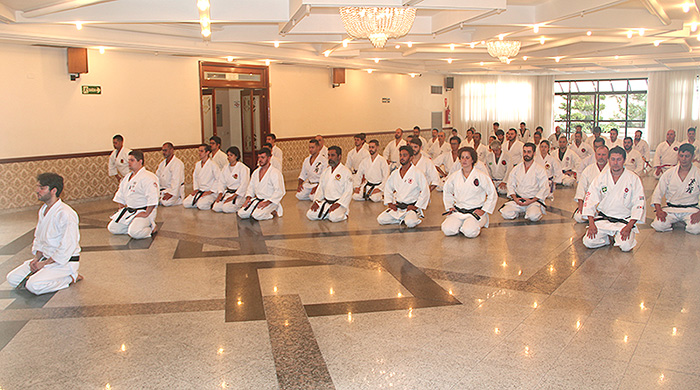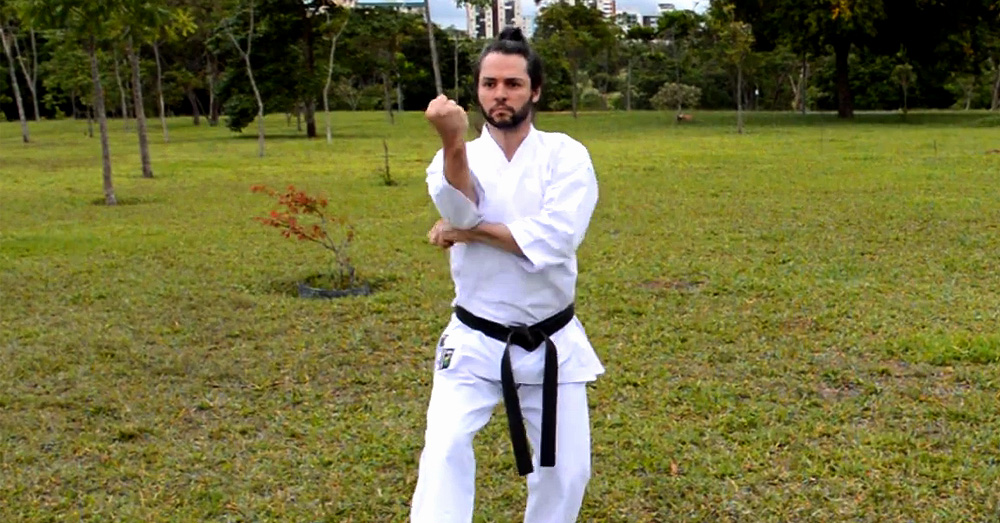Father, husband and citizen. Translator with various published works, chief instructor of Muidokan Karate Kenkyukai and old style karate researcher, with emphasis on bunkai (the study of the meaning of kata movements). Samir is a black belt in Shotokan karate and Kukkiwon taekwondo, and has practiced Shorin-ryu Shinshukan karate, Goju-ryu karate and judo. He currently lives in Brasília/DF (Brasil), where he teaches self-defense in federal public agencies and old style karate (non-commercially) in his private dojo.
Samir Berardo is a karateka and researcher, founder and technical director of Muidokan Karate Kenkyukai (Muidokan Society for Karate Research). He is from the city of Belém (State of Pará) and currently resides in Brasília (Federal District), where he works for a federal security agency. Among other duties, Samir teaches self-defense classes to employees of that public agency. He also has students in Brasília and in the States of Amazonas, Espírito Santo, Minas Gerais, Pará, Paraná, Roraima, Rio Grande do Sul and São Paulo. Samir Berardo also teaches seminars based on his research.
From a young age, Samir had contact with both the martial arts and urban violence itself, due to his life in Belém, one of the most violent cities in the world. This made him witness and go through many experiences, predominantly unpleasant, with situations of violence. Despite this non-recommendable context, his experience also ended up being important learnings on the subject of violence. “At that time, there were also many bullies. That was one of the reasons why I practiced martial arts and I really learned a lot about fighting on the street against those bullies to protect myself and sometimes to protect my friends. I continued doing this a few years later, until I finished school”, he tells in an interview to Whistlekick Martial Arts Radio. During his youth, Samir’s main contacts with martial arts were with capoeira and jiu-jitsu (BJJ), styles that he practiced (and applied when necessary) for about five years.
After finishing college, he took a civil service examination and was approved for the federal security agency where he works today. It was at this time, in 2008, that he came back into contact with martial arts, during the months of the organization’s training course in Brasília, which included training in self-defense. It was the trigger for him to resume training and never stop anymore, becoming interested in practicing a martial art that would be functional for self-defense. While in the capital of Brazil, he had his introduction to karate and trained enthusiastically with sensei Antonio Lima Pinto, from Shorin-ryu Shinshukan, who currently resides in the State of Amazonas.
Returning to Pará, as there was no Shorin-ryu dojo near him, Samir started practicing in the old Shotokan dojo of sensei Paulo Afonso (student of Yoshizo Machida and historic vale-tudo and MMA fighter) in the city of Ananindeua (metropolitan region of Belém). A few months later, he moved to Belém, living more than an hour from the dojo where he trained. So he decided, with the approval of sensei Antonio Lima (with whom he kept in touch and still took advice from), to move to a traditional taekwondo school closer to his residence.
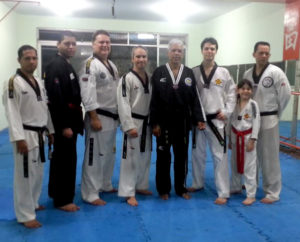 The taekwondo school was run by Edison Mayrinck (student of Korean pioneer in Brazil Yong Min Kim), with a very reinforced Kukkiwon technical foundation, strong influence of Kong Soo Do (Korean karate) Chang Moo Kwan and little focus on the sport side (Olympic Taekwondo). The training was basically like a more relaxed Shotokan, with higher stances and different kata (the poomsae), but done with Shotokan movements. With that, Samir started to train taekwondo formally, and in parallel he continued training Shotokan informally, at home and with friends from karate. He also began to research and learn the names of the techniques in Korean and Japanese, the differences in the execution of movements between styles and also both the taekwondo and Shotokan kata.
The taekwondo school was run by Edison Mayrinck (student of Korean pioneer in Brazil Yong Min Kim), with a very reinforced Kukkiwon technical foundation, strong influence of Kong Soo Do (Korean karate) Chang Moo Kwan and little focus on the sport side (Olympic Taekwondo). The training was basically like a more relaxed Shotokan, with higher stances and different kata (the poomsae), but done with Shotokan movements. With that, Samir started to train taekwondo formally, and in parallel he continued training Shotokan informally, at home and with friends from karate. He also began to research and learn the names of the techniques in Korean and Japanese, the differences in the execution of movements between styles and also both the taekwondo and Shotokan kata.
With about two and a half years in taekwondo, Samir returned to formally training Shotokan and Goju-ryu , in Belém with sensei Fernando Bastos Neto of the Inter-styles Federation of Pará. He had decided that he needed to go back to the “origins” of the art to get deeper. He continued to train the two arts formally in parallel. About a year later he was promoted to black belt in taekwondo. During a period he helped in the academy by leading classes. After more than four years in taekwondo, he decided to continue practicing only karate.
Since that time, Samir was already doing a lot of research and was not satisfied with the modern Shotokan, as he was interested in a karate that was more true to its roots and less sports oriented, with an emphasis on bunkai and self-defense. He had read sensei Kousaku Yokota‘s first two books, which got him interested. Samir then got in touch with sensei Yokota and became friends with him. Yokota Sensei started coming to Brazil regularly and Samir traveled many times to train with him, in addition to participating in seminars of other teachers within the Shotokan.
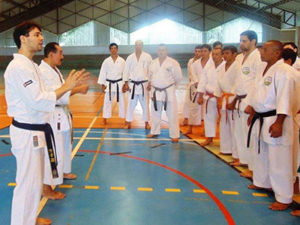 Frustrated with training with little focus on practical karate, Samir followed the advice of sensei Yokota and left the dojo where he was training, accepting an invitation to train the curriculum of the organization that the Japanese sensei had just founded, under his guidance whenever he came to Japan. Brazil and also remotely. Samir Berardo was then the first member of the ASAI organization in Brazil (founding member 001), chosen as Yokota’s private advisor and his representative in the country. Yokota Sensei also invited Samir to translate one of his books into Portuguese. The translation of Shotokan Myths was published in 2017.
Frustrated with training with little focus on practical karate, Samir followed the advice of sensei Yokota and left the dojo where he was training, accepting an invitation to train the curriculum of the organization that the Japanese sensei had just founded, under his guidance whenever he came to Japan. Brazil and also remotely. Samir Berardo was then the first member of the ASAI organization in Brazil (founding member 001), chosen as Yokota’s private advisor and his representative in the country. Yokota Sensei also invited Samir to translate one of his books into Portuguese. The translation of Shotokan Myths was published in 2017.
At that time Samir had a great technical development, since the sensei Yokota’s private lessons involved an immense number of details. Samir had already set up a training group in his city, which was also progressing. About a year after training began under the direct guidance of sensei Yokota, he proposed that Samir Berardo should take a black belt exam with him, as Samir already knew the JKA Shotokan black belt curriculum and was also training the curriculum of the ASAI Shotokan. Also considering that Samir was a Kukkiwon taekwondo black belt, it would be possible to validate his graduation from ASAI, as long as he passed the black belt exam.
It was at least two months of preparatory training, with a series of detailed corrections of various exercises and kata, which culminated in an extensive evaluation and the approval of Samir as a black belt by sensei Yokota. Subsequently, sensei Kousaku Yokota recognized Samir Berardo and sensei Leandre Rosa from the city Campinas in São Paulo (also a member of Muidokan) as ambassadors and co-presidents of ASAI in Brazil.
At the same time, Samir Berardo already had considerable research on the technical fundamentals of karate, which was gradually being published and was beginning to be respected. He maintained (and maintains) contact with foreign researchers such as Andreas Quast, Jesse Enkamp, Noah Legel and Mario McKenna, among others. Sensei Dan Djurdjevic was another major influence for Samir, including with specific directions that helped shape his approach and method of researching karate. Samir considers Dan Djurdjevic the most important sensei of his training, while recognizing the invaluable contribution of others. Sensei Dan Djudjevic also has a special esteem for and respect for Samir as a martial artist, which has been demonstrated several times over the years.
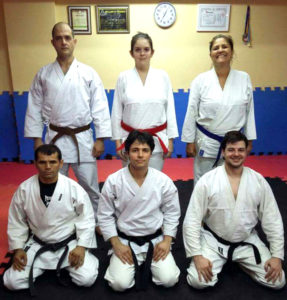 Despite what he learned from Yokota sensei, Samir continued to research Shorin-ryu and Okinawa karate and took classes with other sensei of that lineage, as a teacher who was part of the Kyudokan school and with the late professor Sebastian Rodriguez Valle (Shinshukan), from Rio de Janeiro, even teaching in his dojo. In the constant search for a return to the origins of karate, Shorin-ryu became Samir’s main reference style in his personal training and in the group of training and research that he had kept in his residence for years. Despite this strong connection with Shorin-ryu, Samir continued to have friendly relationships with other styles and sought to learn from all possible sources, including instructors from several other countries, using online interactions for this (many years before this became common because of the Covid-19 pandemic). In recent years, Samir has also revisited his experience with Goju-ryu through contact with members of the Jundokan school, which allowed him to complete the fundamental knowledge of that school’s kata curriculum. In his years of training, Samir also had parallel experiences with judo and krav maga.
Despite what he learned from Yokota sensei, Samir continued to research Shorin-ryu and Okinawa karate and took classes with other sensei of that lineage, as a teacher who was part of the Kyudokan school and with the late professor Sebastian Rodriguez Valle (Shinshukan), from Rio de Janeiro, even teaching in his dojo. In the constant search for a return to the origins of karate, Shorin-ryu became Samir’s main reference style in his personal training and in the group of training and research that he had kept in his residence for years. Despite this strong connection with Shorin-ryu, Samir continued to have friendly relationships with other styles and sought to learn from all possible sources, including instructors from several other countries, using online interactions for this (many years before this became common because of the Covid-19 pandemic). In recent years, Samir has also revisited his experience with Goju-ryu through contact with members of the Jundokan school, which allowed him to complete the fundamental knowledge of that school’s kata curriculum. In his years of training, Samir also had parallel experiences with judo and krav maga.
Over the years, Samir graduated in black belt in taekwondo and shotokan karate. He also had two opportunities for recognition as a black belt graduate in Shorin-ryu, in addition to his experience at Goju-ryu, which he continues to practice. However, his interest in martial arts has always been about practical knowledge of karate, regardless of formal issues such as graduations and, above all, without imposing limits like those of modern styles. As with karate practitioners from the period before the modernization of the art, Samir learned karate from a large number of instructors, with his personal studies and with his own experience.
In addition to his training and learning, currently Samir Berardo is dedicated to his research, didactic development and growth of the Muidokan Karate Kenkyukai. In fact, the major reason for Samir to have students is that today they are precisely the main teachers he has (but he also continues to have training with teachers of other styles and even of other disciplines, such as human biomechanics). Nowadays Samir exercises the role of teacher, but before and above all he is a student of karate, without limitations and always open to review and expand his understanding. This includes maintaining a continuous work of historical and technical research and an extensive analysis of the main legacy left by the old masters: the kata, with a work based on scientific methodology and exhaustive tests of the applications. The focus of Muidokan is to promote the training of a functional, well-founded and efficient karate for self-defense, but also to provide well-being and quality of life to its practitioners.
The work of Samir Berardo and Muidokan has internationally recognized quality by respected names such as Jesse Enkamp (Sweden), Dan Djurdjevic (Australia), Nicolás Pérez (Okinawa/Colombia), Orjan Nilsen (Norway), Noah Legel (United States), Miguel Harker (South Africa), Colin Wee (Australia) and several others.
